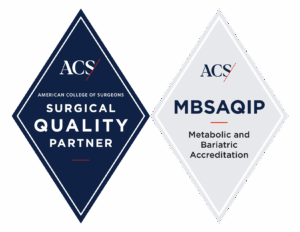Weight Loss Surgery
Your Journey to Health Begins Here
If you are one of the many people who have unsuccessfully battled a serious weight problem, the Baylor Scott & White Medical Center – Frisco’s Weight Loss Management and Surgery Program can provide hope through a comprehensive surgical weight loss program for qualified patients.
Are you a candidate for weight loss surgery?
If you weigh 100 pounds or more over your ideal body weight and the usual diets have failed, surgery for weight loss can help you lose weight and keep it off.
Qualifications for surgery may vary by location but can include the following:
- Have a body mass index (BMI) of 40 or greater*
- BMI of 35-40 with significant co-morbidity (i.e. such as diabetes, hypertension, obstructive sleep apnea, heart disease, etc.)
- BMI of 30-35 with obesity-related co-morbidities without substantial, durable weight loss and co-morbidity improvement with reasonable non-surgical methods. Documentation of medical necessity is required.
- Documented dietary attempts ineffective.

Testimonials from Patients
Commitment to Quality
Baylor Scott & White Medical Center – Frisco is accredited by the American College of Surgeons METABOLIC AND BARIATRIC SURGERY ACCREDITATION AND QUALITY IMPROVEMENT PROGRAM (MBSAQIP). Faced with clinical evidence that the most experienced weight loss surgery programs have the lowest rates of complications,
MBSAQIP was created to recognize weight loss surgery centers that perform well and help weight loss surgeons continue to improve the quality and safety of the care provided. This accreditation means that our Bariatric Surgery Program offers high-quality care by a multidisciplinary team using the appropriate equipment, pathways, and protocols to ensure our patients experience the best possible outcomes.
Sometimes, weight loss surgery can be accomplished with minimally invasive techniques using state-of-the-art ROBOTIC SURGERY equipment.
In addition, the bariatric or weight loss program at Baylor Frisco is designated as follows:
- Aetna Institutes of Quality for Bariatric Surgery
- Blue Distinction Center + for Bariatric Surgery
- Optum United Healthcare Bariatric Center of Excellence
- Questions? Click here to fill out a contact form to reach our Weight Loss Surgery Coordinator.
- Nutrition Education for Weight Loss Surgery Video Click to view a general nutrition education video for weight loss surgery patients. Always follow the specific instructions provided to you by your physician.
- Weight Loss Surgery Guide Click to view and print our Guide to Weight Loss Surgery
- Monthly Support Group See the calendar
- Infusion Center Click here to find out more about infusion therapy
- Celebrate Vitamins Click here to order discounted vitamins for Weight Loss Surgery patients


FAQs
What is bariatric surgery?
Bariatric surgery is a surgery performed to help individuals with weight loss. These operations have an impact on patients’ weight and the health of their metabolism (breakdown of food into energy). In addition to their ability to treat obesity, these operations are very effective in treating diabetes, high blood pressure, sleep apnea, and high cholesterol, among many other diseases. These operations also have the ability to prevent future health problems. The benefits allow patients with obesity who choose to undergo treatment to enjoy a better quality of life and a longer lifespan.
Today’s metabolic and bariatric operations have been refined over the course of many decades and are among the best-studied treatments in modern medicine. They are performed with small incisions using minimally invasive surgical techniques (laparoscopic and robotic surgery). These advancements allow patients to have a better overall experience with less pain, fewer complications, shorter hospital stays, and a faster recovery. These operations are extremely safe, with complication rates that are lower than common operations such as gallbladder removal, hysterectomy, and hip replacement.
The goal of these operations is to modify the stomach and intestines to treat obesity and related diseases. The operations may make the stomach smaller and also bypass a portion of the intestine. This results in less food intake and changes how the body absorbs food for energy resulting in decreased hunger and increased fullness. These procedures improve the body’s ability to achieve a healthy weight.
What is the safest form of weight loss surgery, what types of surgery are there?
Weight loss surgery, also known as bariatric surgery, is a tool to produce significant weight loss for morbidly obese people. If you have unsuccessfully battled a serious weight problem, Baylor Frisco can help you take control of your health and change your life. We have devoted the necessary resources to provide you with comprehensive care, including patient education, pre-surgical counseling, advanced surgical options, and long-term post-surgical care. Baylor Frisco offers several different kinds of weight loss surgery designed to help patients manage their weight including:
How much is weight loss surgery?
Most surgeons will work with your insurance company to determine your out-of-pocket expense and will be able to provide you with your full cost. The price of your weight loss surgery will depend on several factors:
- The type of surgery you’re having. Types of weight loss surgery include gastric bypass, adjustable gastric banding, sleeve gastrectomy, and duodenal switch. Each has a different fee and the procedure suggested for you will be made based on your history and the surgeon’s recommendation.
- Your surgeon’s fee. This will vary based on the procedure’s complexity.
- The hospital you choose. Costs will vary and may include the operating and hospital rooms, among other fees.
Does insurance cover weight loss surgery and how do I get weight loss surgery approved?
Insurance coverage varies for weight loss surgery procedures between insurance carriers. It is important that you call your insurance provider to determine if your policy covers surgical weight loss. Insurance companies often require medically supervised diets that can span up to 6 months. The length of time for insurance approval depends on each insurance plan and its qualifications.
Important Questions to Ask Your Insurance Provider:
- Do I have coverage for weight loss/bariatric surgery? Provide them with the diagnosis code E66.01.
- What are the criteria for surgery?
- BMI (body mass index)
- Co-morbidities – how many and which medical conditions qualify
- How many months of medical weight management are required prior to surgery?
- Is my insurance plan self-funded?
Does Medicare cover bariatric surgery?
Medicare covers weight loss surgery in most cases assuming you meet the coverage requirements. Medicare will not cover surgery for individuals who smoke and mandates that the patient has been tested for nicotine and its metabolites to ensure that they are not smoking. Not every weight loss procedure is covered. If the criteria are met, Medicare covers Gastric Bypass, Lap Bands, and Gastric Sleeve surgeries.
The following criteria must be met in order for Medicare to cover a weight loss surgery:
- BMI (body mass index) of 35 or greater – BMI Calculator
- At least one co-morbidity – This is a serious illness directly related to your obesity.
- i.e. sleep apnea, high blood pressure, diabetes, etc.
- You must have documented evidence that you’ve been obese for the last 5 years.
- Documented participation in a medically supervised weight loss program. Typically, you must show that you have participated and failed more than one program.
- A letter from your physician recommending or supporting weight loss surgery.
- Passed a psychological evaluation.
- All other treatable medical diseases have been ruled out as a possible cause of your obesity. Adrenal, pituitary, or thyroid screening tests have been completed and are normal.
The following procedures are currently covered by Medicare:
- Gastric Bypass
- Gastric Lap Band
- Duodenal Switch
- Sleeve Gastrectomy is covered on a regional basis – have a local bariatric surgeon’s office check for you or call your local Medicare administrator’s office.
What are the best vitamins to take after bariatric surgery?
Each surgeon has a different protocol, but your vitamins after surgery are crucial to your health and well-being. In general, most surgeons will ask you to take a chewable bariatric multivitamin, calcium, Vitamin B12, Iron, and Vitamin D3 supplements. Bariatric vitamins contain more of each vitamin than regular ones, as the patients cannot absorb the entire amount taken any longer after bariatric surgery. All weight loss surgery patients regardless of the procedure performed should avoid non-steroidal anti-inflammatory drugs (NSAIDS) like Ibuprofen, Advil, Alleve, Motrin, Naproxen, Aspirin, etc. These drugs can cause ulcers and bleeding in the stomach.
How long from consultation to bariatric surgery?
Weight loss surgery requires a commitment to lifestyle changes, including what you eat and how often you exercise. Your surgeon will help you set the groundwork, so you’re mentally and physically prepared for life after bariatric surgery. The entire process, from consultation to surgery, generally takes about six months to complete. Weight loss surgery is a tool that can help you kick start a healthier lifestyle and maintain your weight loss.
Do I qualify for weight loss surgery?
If you weigh 100 pounds or more over your ideal body weight and the usual diets have failed, surgery for weight loss can help you lose weight and keep it off.
Qualifications for surgery may vary by location but can include:
- Have a body mass index (BMI) 30 or greater*
- Type 2 diabetes
- High cholesterol
- High blood pressure
- Heart disease and stroke
- Sleep apnea
- Asthma
- Arthritis and joint disease
- Reflux disease and heartburn
